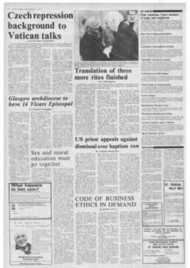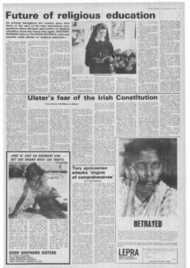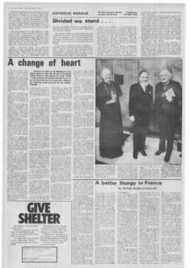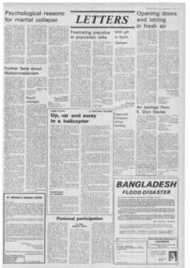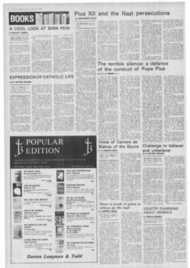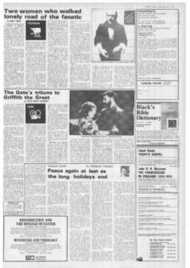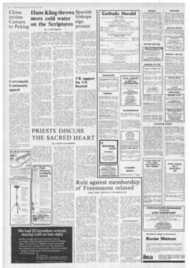Page 6, 27th September 1974
Page 6
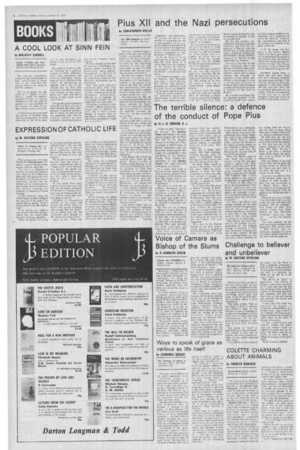
Report an error
Noticed an error on this page?If you've noticed an error in this article please click here to report it.
Tags
Share
Related articles
Defence Of Pius Xli's Attitude To Nazis
Pope Pius And Jews
German Church's Stand Against Euthanasia
Pius 'saved Jews From 1939' Claims New Book
West End Books Anti-pope Play
Pius XII and the Nazi persecutions
by CHRISTOPHER HOLLIS Into That Darkness by Gitta Sereny (Andre Deutsch £4.25) This book is predominantly a study of the character of Franz Stang], commander of the largest of the Nazi extermination camps, Treblinka, and an account of the appalling massacres of Jews that took place there. As such it is both fascinating and beyond question accurate and horrible.
But the main interest of the book for Catholics must necessarily lie in Frau Sereny's criticism of the policies of the Vatican and Pius XII towards Nazi persecutions. There was, she argues, no explicit condemnation of these nearly as frank as there should have been.
Her arguments are that the ecclesiastical authorities did not from the first outspokenly condemn outright the Nazis' policies of euthanasia, and Pius XII certainly knew of, and did not explicitly condemn, the "final act" for the extermination of Jews.
After the German defeat, Germans at the Vatican such as Bishop Metal gave refuge and assistance in escape to Nazi criminals.
As to the first, we may admit that a mistake was made in signing the first Concordat with the Nazi regime when Pius XI was still Pope and the future Pius XII, as Cardinal Pacelli, was his Secretary of State. This doubtless encouraged Hitler in the belief that he had little to fear from ecclesiastical dignitaries.
Frau Sereny tells us how the ex-priest Herr Hartl got Dr Josep Mayer, teacher of Catholic moral theology at the University of Paderborn. to give an opinion in 1939 that euthanasia was to Catholics to some extent an open question.
As a result, Hitler went ahead with his policies and only desisted after Bishops Neuhausler, von Galen and Preysing had protested and — in many people's opinion but not in that of Frau Sereny or of Fr Schneider, an influential Jesuit in Rome — the euthanasia policy was abandoned in consequence of the bishops' protest.
Frau Sereny seems here to have overlooked an important point. The question on which Dr Mayer was asked to give an opinion was whether mercykilling of the wholly sick and in c p ac i t ate d , human
"vegetables" was permissible. We do not say that he was justified in saying that this was an open question, but it is certainly a different question from that of whether it was legitimate to kill without discrimination political opponents or any members of "inferior races."
As for the "final act" of the extermination of the Jews, did Pius XII know about it? It seems clear from the evidence of M. Papee, the Polish representative at the Vatican, that he did — at least in general terms.
It is sometimes argued — by, for instance, Herr Hochhuth and others — that if only Pius had openly and publicly protested, he could have saved the Jews. This is very doubtful. as Frau Sereny seems to agree.
If we are to give credence to the somewhat mysterious memorandum of Martin Bormann, it was Hitler's intention after he had won the war to unloose a campaign of extermination against all Christians, Catholic or Protestant.
But certainly he could not alford such an affront to world opinion so long as victory was uncertain but still to be hoped for. (Frau Sereny says in a number of places that no Catholic bishop was arrested during the war, but Bishop Neuhausler spent almost the entire war in Dachau.) Protests while the outcome of the war was still uncertain might have had effect. But by. 1942. the year of the "final act," Hitler knew that he had lost the war. The murder of the Jews was merely a frantic act of sadistic hatred — quite without purpose.
A protest from the Pope would most likely have had the effect of unloosing a similar campaign against the Catholics. I do not think that Frau Sereny's suspicion that Pius was anti-semitic is justified, or that he was pro-Nazi.
But he was certainly surrounded by Germans and liked Germans, and from his experience in Munich after the 1914-18 war he had a profound horror of Russian Bolshevism, and thought a strong Germany necessary to defend Europe against such an invasion.
Also it is true that he was more concerned about the defence of Catholics than about that of non-Catholics or of nonbelievers, and in this in strong contrast with Roncalli, his successor as John XXIII, who offered so unstintingly his love to all men and all women of whatever belief and who played so noble and unequivocal a part in defence of the Jews in Bulgaria.
But I would myself argue that the supreme guardian of the moral law should have spoken out quite unequivocably in condemnation of so monstrous an evil as the "final act," whatever the consequences and even if his protest was destined to be quite ineffectual.
As for the charge that Germans at the Vatican, • Bishop Iludal and others, gave protection to and helped the escape of Nazi fugitives after the German defeat I do not attach much importance to that. The Vatican had given refuge to Allied and Jewish fugitives during the war.
Doubtless among those to whom they later gave refuge were some villainous criminals, but what means had they of discovering who among those who appealed to them were villains and who were not? There was no practical alternative in the utterly confused circumstances of the day but to accept refugees' stories and to give the benefit of the doubt to mercy.
blog comments powered by Disqus



